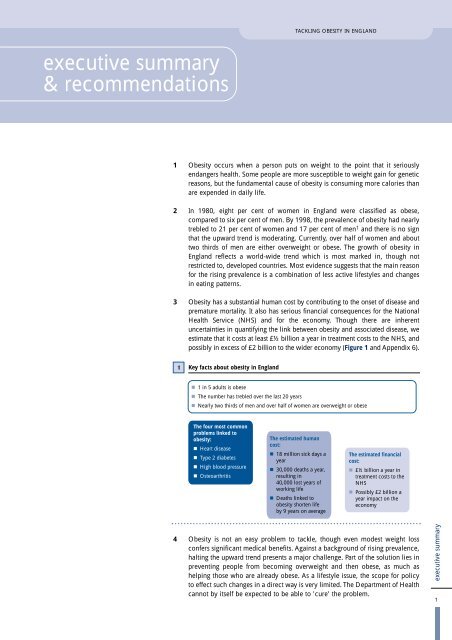TACKLING OBESITY IN ENGLANDexecutive summary& recommendations1 <strong>Obesity</strong> occurs when a person puts on weight to the po<strong>in</strong>t that it seriouslyendangers health. Some people are more susceptible to weight ga<strong>in</strong> for geneticreasons, but the fundamental cause of obesity is consum<strong>in</strong>g more calories thanare expended <strong>in</strong> daily life.2 In 1980, eight per cent of women <strong>in</strong> <strong>England</strong> were classified as obese,compared to six per cent of men. By 1998, the prevalence of obesity had nearlytrebled to 21 per cent of women and 17 per cent of men 1 and there is no signthat the upward trend is moderat<strong>in</strong>g. Currently, over half of women and abouttwo thirds of men are either overweight or obese. The growth of obesity <strong>in</strong><strong>England</strong> reflects a world-wide trend which is most marked <strong>in</strong>, though notrestricted to, developed countries. Most evidence suggests that the ma<strong>in</strong> reasonfor the ris<strong>in</strong>g prevalence is a comb<strong>in</strong>ation of less active lifestyles and changes<strong>in</strong> eat<strong>in</strong>g patterns.3 <strong>Obesity</strong> has a substantial human cost by contribut<strong>in</strong>g to the onset of disease andpremature mortality. It also has serious f<strong>in</strong>ancial consequences for the <strong>National</strong>Health Service (NHS) and for the economy. Though there are <strong>in</strong>herentuncerta<strong>in</strong>ties <strong>in</strong> quantify<strong>in</strong>g the l<strong>in</strong>k between obesity and associated disease, weestimate that it costs at least £½ billion a year <strong>in</strong> treatment costs to the NHS, andpossibly <strong>in</strong> excess of £2 billion to the wider economy (Figure 1 and Appendix 6).Key facts about obesity <strong>in</strong> <strong>England</strong>n 1 <strong>in</strong> 5 adults is obesen The number has trebled over the last 20 yearsn Nearly two thirds of men and over half of women are overweight or obeseThe four most commonproblems l<strong>in</strong>ked toobesity:n Heart diseasen Type 2 diabetesn High blood pressuren OsteoarthritisThe estimated humancost:n 18 million sick days ayearn 30,000 deaths a year,result<strong>in</strong>g <strong>in</strong>40,000 lost years ofwork<strong>in</strong>g lifen Deaths l<strong>in</strong>ked toobesity shorten lifeby 9 years on averageThe estimated f<strong>in</strong>ancialcost:n £½ billion a year <strong>in</strong>treatment costs to theNHSn Possibly £2 billion ayear impact on theeconomy4 <strong>Obesity</strong> is not an easy problem to tackle, though even modest weight lossconfers significant medical benefits. Aga<strong>in</strong>st a background of ris<strong>in</strong>g prevalence,halt<strong>in</strong>g the upward trend presents a major challenge. Part of the solution lies <strong>in</strong>prevent<strong>in</strong>g people from becom<strong>in</strong>g overweight and then obese, as much ashelp<strong>in</strong>g those who are already obese. As a lifestyle issue, the scope for policyto effect such changes <strong>in</strong> a direct way is very limited. The Department of Healthcannot by itself be expected to be able to 'cure' the problem.executive summary1
TACKLING OBESITY IN ENGLAND5 The Government believes, however, that prevention is important. TheDepartment of Health has prioritised the reduction of coronary heart diseaseand cancers, and is develop<strong>in</strong>g preventive strategies to improve diet andphysical activity. The NHS provides management of obesity, rang<strong>in</strong>g fromgeneral advice on diet and exercise to onward referral for specialist help. OtherGovernment departments have an <strong>in</strong>fluence through school education and thepromotion of healthy eat<strong>in</strong>g and physically active travel and recreation.6 We exam<strong>in</strong>ed the way <strong>in</strong> which the NHS manages the problem of obesity. Wefound that many health authorities reflected the problem <strong>in</strong> their local healthplann<strong>in</strong>g, and some had dedicated strategies to address it. The <strong>National</strong> ServiceFramework for coronary heart disease, published <strong>in</strong> March 2000, signals theDepartment of Health's <strong>in</strong>tention to ensure that, <strong>in</strong> future, all NHS bodies,work<strong>in</strong>g closely with local authorities, will develop and implement effectivepolicies for reduc<strong>in</strong>g overweight and obesity.7 With<strong>in</strong> the NHS, most contact with overweight and obese people occurs <strong>in</strong>general practice. We surveyed general practitioners and practice nurses andfound that many provided valuable services <strong>in</strong> identify<strong>in</strong>g those at risk fromweight ga<strong>in</strong> and offer<strong>in</strong>g advice and support. But this was not universally thecase, and there is scope to clarify the role of the primary care team and spreadgood practice. There is uncerta<strong>in</strong>ty about which <strong>in</strong>terventions are effective <strong>in</strong>prevent<strong>in</strong>g and treat<strong>in</strong>g obesity, and our survey identified a widespread feel<strong>in</strong>gamongst general practitioners that they need more <strong>in</strong>formation on how toaddress weight issues effectively, and that guidance would be valuable.8 We also assessed how well the various public sector agencies comb<strong>in</strong>e to<strong>in</strong>fluence the prevalence of obesity. We found that while Governmentdepartments are work<strong>in</strong>g closely together, particularly to encourage healthylifestyles amongst schoolchildren, there are opportunities to build further on thesuccess of jo<strong>in</strong>t work<strong>in</strong>g to date.9 One function of this report is to stimulate wider debate, and contribute to thedevelopment of longer term changes <strong>in</strong> which <strong>in</strong>dividuals are aware of theproblems of obesity. We view this <strong>in</strong> the same light as another lifestyle issue -smok<strong>in</strong>g - where education and time have brought about significant changesfor the better. Our detailed f<strong>in</strong>d<strong>in</strong>gs and recommendations follow.Ma<strong>in</strong> f<strong>in</strong>d<strong>in</strong>gs and recommendations on themanagement of obesity <strong>in</strong> the NHS10 We found that while significant health benefits could be achieved through<strong>in</strong>terventions that help people to lose excess weight, the management ofoverweight and obese patients with<strong>in</strong> the NHS was patchy. Local strategies toaddress obesity had been developed <strong>in</strong> some areas, but not <strong>in</strong> the majority.2execuitve summary11 At the time of our research <strong>in</strong> Summer 1999, there were no national guidel<strong>in</strong>esfor health authorities on how their plans should address obesity. A largemajority of health authorities (83 per cent) had identified obesity as a publichealth risk <strong>in</strong> their Health Improvement Programme, but far fewer (28 per cent)had taken action to address it. About 50 per cent of health authorities told usthat, though they did not have a dedicated obesity strategy, their plans wouldhelp to prevent weight ga<strong>in</strong> and obesity by promot<strong>in</strong>g healthy eat<strong>in</strong>g andphysical activity as part of coronary heart disease or cancer preventionprogrammes. Health authorities' future plans are expected to take account ofguidance on effective strategies to address overweight and obesity, published <strong>in</strong>September 2000 by the Health Development Agency <strong>in</strong> its report onimplement<strong>in</strong>g the preventive aspects of the <strong>National</strong> Service Framework forcoronary heart disease.
















